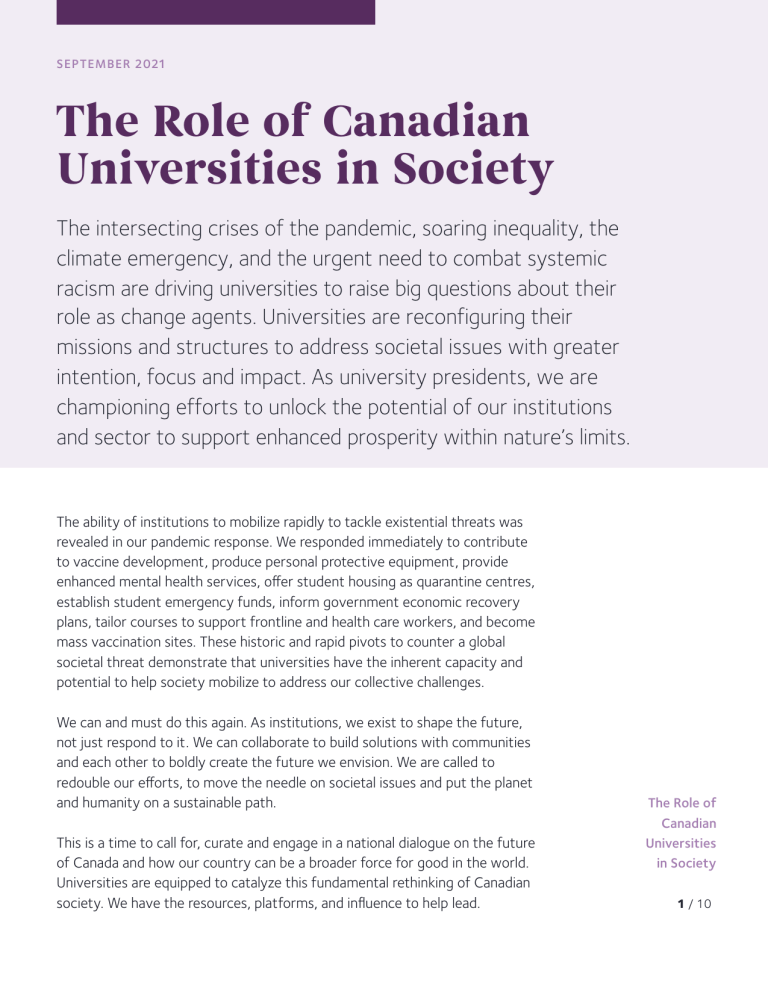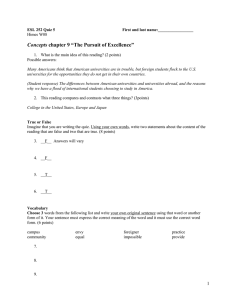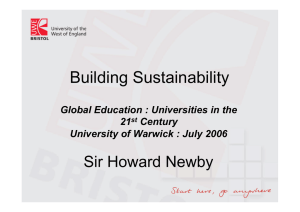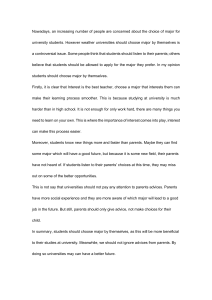
SEPTEMBER 2021 The Role of Canadian Universities in Society The intersecting crises of the pandemic, soaring inequality, the climate emergency, and the urgent need to combat systemic racism are driving universities to raise big questions about their role as change agents. Universities are reconfiguring their missions and structures to address societal issues with greater intention, focus and impact. As university presidents, we are championing efforts to unlock the potential of our institutions and sector to support enhanced prosperity within nature’s limits. The ability of institutions to mobilize rapidly to tackle existential threats was revealed in our pandemic response. We responded immediately to contribute to vaccine development, produce personal protective equipment, provide enhanced mental health services, offer student housing as quarantine centres, establish student emergency funds, inform government economic recovery plans, tailor courses to support frontline and health care workers, and become mass vaccination sites. These historic and rapid pivots to counter a global societal threat demonstrate that universities have the inherent capacity and potential to help society mobilize to address our collective challenges. We can and must do this again. As institutions, we exist to shape the future, not just respond to it. We can collaborate to build solutions with communities and each other to boldly create the future we envision. We are called to redouble our efforts, to move the needle on societal issues and put the planet and humanity on a sustainable path. This is a time to call for, curate and engage in a national dialogue on the future of Canada and how our country can be a broader force for good in the world. Universities are equipped to catalyze this fundamental rethinking of Canadian society. We have the resources, platforms, and influence to help lead. The Role of Canadian Universities in Society 1 / 10 We can and must leverage our role as agents of change, harnessing all our assets and instruments as greater agents of good. We are at a historic moment in time when institutions are called to repurpose our missions to help deliver a sustainable future for all. Call to Action This document is designed as a springboard for universities and their communities to accelerate and scale their contribution to a better world. It is a conversation document providing context for the work that lies ahead. Institutional leaders can use this as a: ܰ Discussion document to inform institutional strategic planning. ܰ Backgrounder for mid-course strategic plan check-ins. ܰ Resource for discussions with boards, executives, leadership teams, faculty, students, and communities. ܰ Platform document to engage partners at the national and provincial level. ܰ Reference document for speeches and op eds. ܰ Source of ideas and language to help shape external university communications. University leaders can also use this document to frame their efforts for greater engagement with society partners and each other at the regional, provincial, national, and global scale as society seeks leaders to help resolve the complex challenges that lie ahead. This narrative can help our institutions determine what we are already doing and if more can be done, as we think about, prepare for, and act on the future. The Role of Canadian Universities in Society 2 / 10 How we developed this narrative on the role of Canadian universities in society A group of Canadian university presidents met over 2020-21 to develop this story of how universities are accelerating and scaling our efforts to build a resilient, equitable and low-carbon world for present and future generations, in partnership with, and benefiting, our students, and our collective communities. The dialogues to produce this paper were convened by the McConnell Foundation. The following is a list of the Presidents who contributed to this narrative: Joy Johnson (co-chair) .................................Simon Fraser University David Sylvester (co-chair) ...........................University of St. Michael’s College Asima Vezina ....................................................Algoma University David Docherty...............................................Brandon University Lynn Wells..........................................................Brock University Benoit-Antoine Bacon ...................................Carleton University Graham Carr.....................................................Concordia University Gillian Siddall ...................................................Emily Carr University of Art & Design Moira McPherson...........................................Lakehead University Sophie D’Amours ............................................Université Laval David Farrar......................................................McMaster University Annette Trimbee .............................................MacEwan University Vianne Timmons .............................................Memorial University of Newfoundland Jean Paul Boudreau.........................................Mount Alison University Tim Rahilly ........................................................Mount Royal University Ramona Lumpkin ............................................Mount Saint Vincent University Ana Serrano .....................................................OCADU Patrick Deane ..................................................Queen’s University Philip Steenkamp ............................................Royal Roads University Mohamed Lachemi ........................................Ryerson University Robert Summerby-Murray ..........................Saint Mary’s University Melanie Humphreys .......................................The King’s University Santa J. Ono .....................................................University of British Columbia Michael Benarroch .........................................University of Manitoba Joanne MacLean .............................................University of the Fraser Valley Deborah Saucier .............................................Vancouver Island University Rhonda Lenton ................................................York University Maggie Matear ...............................................Yukon University Geoff Payne ....................................................University of Northern British Columbia The Role of Canadian Universities in Society 3 / 10 Universities can play a major role in addressing the issues that threaten society. We can leverage and mobilize our education, research, relationships, assets, resources, scale, reach, and influence to pursue societal solutions and significantly transform the economic, social, and political systems needed to address society’s challenges. We can amplify and harness the passion of student changemakers and mobilize our diverse constituencies — faculty, staff, alumni, and community, business, and public sector partners — to drive local and global change. At this pivotal moment university leaders have an opportunity to make decisions and take actions that will reverberate beyond our own borders and lifetimes to give students and children agency in and hope for creating a better future. Universities are well-equipped for this role — and by redoubling our efforts in the following ways we can help build a sustainable future for all. The Role of Canadian Universities in Society 4 / 10 The following is a list of 14 change agent roles our universities are playing in building a better society. These are the intersecting roles we can further harness to accelerate and scale our contribution and become an even greater force for good. global 1 Tackle societal issues Universities have an extraordinary resource of talented professors, administrators, and students. Institutions have the ability, because of the research and intensity of talent, to address the deep-seated challenges the world is facing and do it together. Universities excel in the interdisciplinary realm, and when we combine our efforts, we can significantly move the needle on complex challenges locally and globally. community 2 Co-create solutions Universities collaborate with local communities to address their challenges, contribute to their problem-solving methodologies, and drive better outcomes. Universities support communities in their social and environmental justice objectives. Depending on the nature of the community challenge, we pull interdisciplinary and cross-cultural resource teams from across the university and develop community and business partnerships and collaborations to tackle local issues. forces 3 Join with each other The post-secondary sector collaborates with each other regionally, across Canada and globally to tackle systemic issues together. Through concerted action universities mobilize our collective assets, resources, and relationships to become bolder engines for social good and help society cope with its emerging systemic challenges. The Role of Canadian Universities in Society 5 / 10 the 4 Engage business sector Universities are poised to engage and mobilize the business and financial sector at scale to co-create solutions to society’s challenges and help put humanity on a sustainable path. Institutions can harness their business partnerships and relationships, including with alumni, suppliers, financial institutions, business associations, and local business leaders, to redesign economic and financial systems to ensure long-term well-being for all within nature’s limits. By bringing their assets and resources to the table along with business, universities can accelerate progress on system change, in tandem with their government and civil society partners. multi-stakeholder 5 Lead collaborations Universities convene multi-stakeholder and multi-sector collaborations bringing business, community, and public sector organizations together to address shared societal goals. We contribute our research and knowledge to help others reimagine a society and economy in which all can live well within planetary thresholds, and no one is left behind. Universities mobilize government and other stakeholders in public policy and program development to build a just and sustainable recovery. 6 Harness convening power By leveraging our convening role, universities bring nations, communities, and stakeholders together. We address societal threats by leading national dialogues and hosting multi-stakeholder roundtables, including government officials, the media, industry, and other parties. With connections around the world, we bridge nations and multilateral organizations to tackle shared global challenges. We convene diverse stakeholders around common topics, build relationships, and create coalitions to drive collaborative change. The Role of Canadian Universities in Society 6 / 10 social 7 Become innovation platforms The university is a test site where social innovations are piloted, proven, and scaled up to a city, province, territory, country, or the world. Institutions are places where new approaches are prototyped and replicated by other governments, businesses, and community organizations. As role models of innovation, we change the way jurisdictions approach these issues, thereby permeating Canadian social policies. 8 Centre Indigenous knowledge Universities can centre Indigenous knowledge in our curricula, pedagogy, physical spaces, faculty, and staff complement, leadership styles, organizational structure, and governance systems. Institutions can engage on- and off-campus communities in reconciliation and decolonization, ensuring Indigenous peoples and perspectives shape our efforts. Universities are leaning into the TRC Calls to Action. We recognize the role and responsibility we have to play a leadership role in creating and modelling interdisciplinarity, in honouring multiple knowledges, and in creating a deeper and wider understanding of ways of knowing: in teaching, research and campus spaces. 9 Dismantle systemic racism Universities can make our campuses and communities places of safety, respect and belonging, helping dismantle oppression, racism, and inequities. We uphold and uplift the voices of under-represented and marginalized communities ensuring all can flourish. Institutional diversity and inclusion leadership influences societal shifts, equipping the next generation of leaders to become equity champions and role models. The Role of Canadian Universities in Society 7 / 10 10 Develop future leaders Universities have influence in moulding future leaders in every sector by ensuring students are taught how to consider the greater good; this approach is embedded across our curriculum and experiential learning. Universities develop and promote engaged citizenship and a sense of responsibility, empathy, and compassion in students. We equip our ­students in values-based decision-making and in understanding the root cause of issues. Universities offer curricula that directly address social and environmental justice. With our focus on experiential learning, we partner with business, industry, and community organizations to provide real-life ­opportunities to tackle these issues. This will influence how business, ­government and community organizations operate in future. 11 Educate existing leaders Universities provide executive education programs to upgrade and re-skill alumni in areas that their earlier education may have overlooked. Through continuing studies, institutions help returning students challenge their current ways of thinking, learn how to address social and environmental risks and challenges, and pick up skills in collaboration, social innovation and systems thinking. With our focus on lifelong learning, universities up-skill and re-skill alumni to play a stronger role as socially responsible community, business, and government leaders. public 12 Raise awareness Universities offer public courses and lectures on emerging topics of interest, where people come together to discuss provocative issues. We engage the community in local events where community members interact with students who are learning new ideas and ways of being. This helps the public learn about deep-seated issues and enhance awareness and understanding of the need, and solutions for, societal change. The Role of Canadian Universities in Society 8 / 10 research 13 Leverage for social change Universities conduct and mobilize research to understand societal issues and to identify solutions. We support research that tackles social justice, racism, and environmental threats. We have data and insights into why and how society needs to transition to a sustainable and just future. Our evidence-based research helps business, governments, and civil society understand societal trends and risks that will affect their regions, operations, and value chains so they can prepare for and influence them. We package and share and share our knowledge with industry, business, professional groups, governments and the public sector, and civil society organizations. Universities work closely with organizations and coalitions to develop evidence to inform advocacy efforts to advance policy solutions to social injustice and environmental degradation. 14 Harness administrative operations Universities can embed social impact across our operations, harnessing our physical and financial assets to address societal issues. We have the opportunity to model social and environmental justice in our policies, procedures, decisions, platforms, and systems. We are pioneers, pathfinders, and experimenters, and lead the way by creating prototypes that other organizations learn from and adopt. When we share our learnings and practices with other organizations in business, community organizations, and across the public sector, we create a roadmap that others can follow. The Role of Canadian Universities in Society 9 / 10 Concluding Thoughts Universities are already leading the way in addressing acute societal concerns — and we know that more must and can be done. We are at a historic moment in time when institutions are called to repurpose our missions to help deliver a sustainable future for all. These are the assets and roles we can harness to further accelerate our contribution and become a greater force for good. The Role of Canadian Universities in Society 10 / 10




